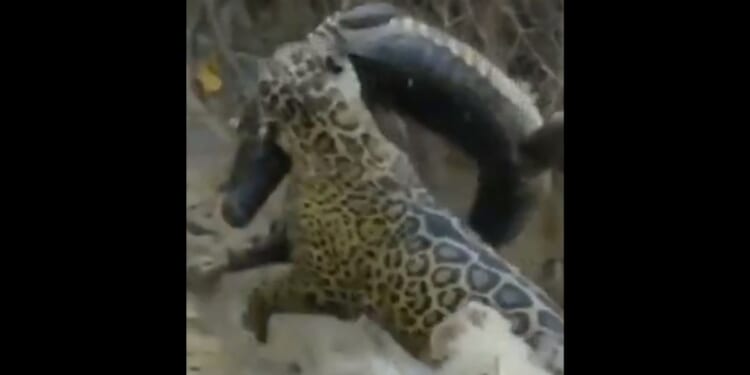God intended us to live in nature but not to worship it.
In His infinite wisdom, He made human beings rational and moral creatures and placed us in a world that is neither rational nor moral. And He did this so that we would have the freedom to choose Him.
Thoughts like these leap to mind when one encounters nature at its most brutal.
For instance, anyone who has spent time on the social media platform X in recent years might have seen a short viral clip of a jaguar dragging a crocodile out of the water and carrying it by its throat up a steep embankment.
If you have not seen that brief clip, you may watch it below.
Trending:
Jaguar dragging a 8 ft long crocodile. pic.twitter.com/k2kFfFNOMA
— Stoic Q🇺🇸 (@DUC916KEN) December 13, 2023
It turns out that this 17-second clip came from a four-minute video posted to YouTube in 2019 by the Love Nature channel.
That lengthier video intrigues, astonishes, terrifies and mostly estranges us from this nature we inhabit.
Is the environmentalist claim that “nature is fragile” true?
The ferocious jaguar attack occurred in Brazil’s Pantanal region, which the video narrator described as “the world’s largest tropical wetland.”
Social media users, of course, referred to the jaguar’s prey as a “crocodile.” But in fact the creature is a caiman, which the narrator called “close relatives of the alligator.” Millions of yacare caiman live in the region.
And the caimans are no ordinary prey, for males can grow to eight feet long and weigh 130 pounds.
Meanwhile, only 100 or so jaguars prowl the Pantanal. But they are more than a match for the caiman. Male jaguars, for instance, can grow to 200 pounds.
Furthermore — and remarkably — “jaguars are superb swimmers.”
At the 2:15 mark of the video, the jaguar prepared to pounce on its prey. Seconds later, the world’s third-largest cat leapt into the water.
The jaguar got the upper hand from the beginning and tried to maintain its grip on the caiman’s neck. But the victim rolled over, forcing the giant cat to reassert its dominance.
Less than 30 seconds into the fight, the jaguar clamped its powerful jaw around the caiman’s throat. The reptile thrashed but never again escaped.
At that point, the jaguar leapt out of the river and scaled the embankment, carrying its massive prey. That footage — the end of a very one-sided fight — is the part that went viral on X.
Readers may view the entire YouTube video below.
Here is a different clip of a jaguar leaping from a tree, apparently pouncing on another caiman, killing it and then dragging the large prey away from the water.
A thrilling encounter: A jaguar’s attack on a crocodile! 🐆🐊💥
— Tansu Yegen (@TansuYegen) September 29, 2023
Of course, the editing and theatrical-music overlay in the above video could mean that multiple cameras captured multiple jaguar attacks and then spliced them together. But it makes little difference.
After all, that final clip, posted to X on Sept. 23, had 1.6 million views as of Thursday afternoon. And the YouTube video from 2019 had 4 million views.
Thus, viewers find those jaguar attacks riveting. But why?
Raw power, awesome and merciless, undoubtedly constitutes part of the answer.
Another part — perhaps the greater part — lies in the kind of thoughts introduced at the beginning of this story.
In other words, what purpose does this natural world serve? Why are we here, in this place, where jaguars throttle caimans and many worse terrors than carnivorousness confront us?
Remember, this is a world that radical leftist environmentalists call “fragile.” They believe, among other things, that they can control its climate. Indeed, the most affluent among them have such hubris that they would take authoritarian measures in order to attempt it.
Those people worship only nature or themselves.
Needless to say, the latter forms no proper object for worship. And having seen nature’s brute force, whether in jaguars or a thousand other sources of danger, why would anyone worship it?
The answer, of course, is that we must not. If scenes such as the jaguar killing the caiman make us feel alienated from this world, it is because we do not belong here.
We know that God created nature, as He created us. And we know that He sent His only Son into nature to redeem us, lead us out of this nature and bring us to the place where we do belong.













